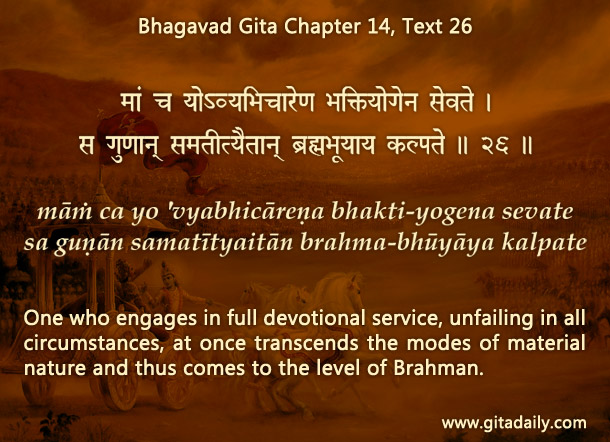Toward the end of the fourteenth chapter (14.21), Arjuna asks Krishna, “What are the characteristics of those who transcend the modes? And how do they transcend the modes?” His question is a natural follow-up to the chapter’s explanation of how the modes bind everyone.
Krishna answers by describing the internal characteristics (14.22-23) and external characteristics (14.24-25) of those who have transcended the modes. Then, he recommends undeviating bhakti as the means for transcending the modes (14.26). It is in this verse that we find the only occurrence of the compound-word ‘bhakti-yoga.’
Undoubtedly, the theme of bhakti is prevalent throughout the Gita and most emphatically in its middle six chapters. Still, what might the singular occurrence of the word here signify? Seen in context, it could underscore the extraordinariness of this Gita declaration: though it explains how we are bound using the sankhya metaphysical concept of the modes, it emphasizes the means of freedom to be bhakti.
Given that sankhya and bhakti are two distinct traditions in the history of Indian philosophy, this Gita verse stresses that mere intellectual understanding of how the modes entangle is not enough, even if it conveys the gravity of our bondage. To be free, we need not the vision of the intellect, but the dedication of the heart. Only when we devote ourselves to the Lord who resides and presides beyond the modes can we see through and go beyond the modes.
Through this declaration, Krishna reiterates his consistent call to Arjuna to do his duty of fighting — if he fights as a devotional service, he won’t be bound by the modes, but will be liberated.
One-sentence summary:
Arjuna’s question about the way to transcend the modes paves the way for Krishna to establish the pre-eminent position of bhakti as the means for both ultimate liberation and immediate action.
Think it over:
- What is special about the wording of Gita 14.26?
- What is special about the import of Gita 14.26?
- How does Krishna use Arjuna’s question to emphasize both an ultimate truth and an immediate need?
***
14.21: Arjuna inquired: O my dear Lord, by which symptoms is one known who is transcendental to these three modes? What is his behavior? And how does he transcend the modes of nature?
To know more about this verse, please click on the image


Now I understand why this philosophy cannot be understood by everyone.
Yes, the Gita’s overall message seen through its key verses is not too tough to understand. But its flow and philosophy require significant intellectual investment.